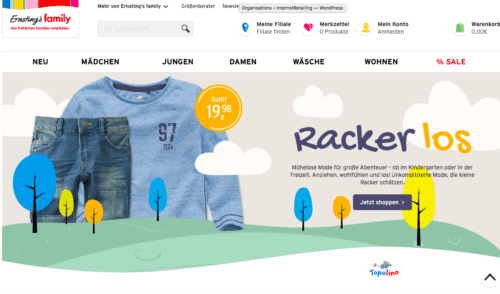German retailer Ernsting’s Family is using machine-learning to set prices for all its products, across channels.
The fashion retailer is using technology from Blue Yonder, tested in a five-month pilot, to optimise prices for all its products across its 1,800 stores and other outlets in Germany and Austria, from April.
The price optimisation solution promises to deliver the best price reduction for each individual product – by size and colour, automatically. It takes into account the sales goals of each store in relation to demand and stock levels when setting prices.
“Our margins on selected articles have already increased within our five-month test. As a result, we decided to enter into a long-term partnership with Blue Yonder,” said Horst Beeck, chief financial officer of the Ernsting’s family corporate group.
Ernsting’s family was previously challenged by the short life cycle and seasonality of its range of products. Each of its stores receives products from the 12 monthly collections every two days. That means products have to sell as fast as possible. During the five-month pilot phase, the Blue Yonder technology enabled the sale of selected items within a defined period of days. By doing so, Ernsting’s family achieved its goals, and with noticeably higher profits and margins on the test collection.
The pilot project included 50 clothing items from collections for women and children. Between July and November 2017, Ernsting’s family used Blue Yonder’s solution to set the prices for this collection in 50 test shops in Germany. That was compared with 50 shops that were not using the solution. The result was faster sales in the test group. Blue Yonder analysed an extensive number of indicators, including stock levels, sales, promotions, climate and weather conditions, as well as the product information for each article.
Uwe Weiss, chief executive of Blue Yonder, said: “By considering store capacity and the cost of each price change, we were also able to noticeably increase sales quotas and margins by conducting a daily data analysis to set automated pricing decisions. This includes whether certain sizes or colours of certain items have better or worse sales numbers. During the pilot, price reductions happened more frequently, but the reduction was lower than average.
The retailer will roll-out the solution across all 1,800 stores in Germany and Austria in April 2018, as well as online for a clothing collection. Over the next three years, the solution will be implemented on its entire digital collection.










